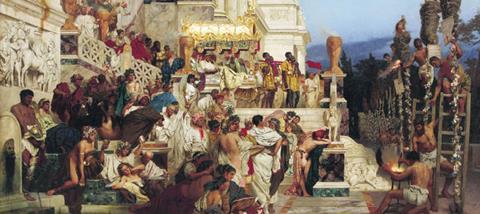
Pliny's most famous letter (as translated by Bible scholar Peter J Williams below) asks the emperor for advice on how to deal with Christians whose new religion is spreading through the Roman Empire. Today it acts as valuable source of information for historians about the beliefs of the early church, which was evidently already strongly committed to the deity of Christ.
It also shines a light on the persecution the early Christian church faced from Roman oppressors. Christians' refusal to bow to the statue of Caesar was seen as an act of political insurrection, and their growing influence had seen a drop in trade for sellers of meat offered to idols. Roman methods of torture and execution to stop the movement were brutal, yet the church continued to grow. Today Christians remain the most persecuted religious group in the world:
"It is my rule, sir, to refer to you all matters of which I am unsure. For who is more capable of guiding my uncertainty or informing my ignorance? Having never been present at any trials of the Christians, I am unacquainted with the method and limits to be observed either in examining or punishing them.
I have also been in great doubt whether any difference is to be made on account of age, or any distinction allowed between the youngest and the adult; whether recanting allows a pardon, or whether if a man has been once a Christian it does not help him to recant; whether the mere profession of Christianity, albeit without crimes, or only the crimes associated with it are punishable.
If they still persevered, I ordered them to be led off to execution
In the meanwhile, the method I have observed towards those who have been denounced to me as Christians is this: I interrogated them whether they were Christians. If they confessed it I repeated the question a second and a third time, adding the threat of capital punishment. If they still persevered, I ordered them to be led off to execution.
For whatever the nature of their belief might be, I could at least feel no doubt that stubbornness and inflexible obstinacy deserved punishment. There were others also possessed with the same madness, but being citizens of Rome I directed them to be sent there.
These accusations spread (as is usually the case) from the mere fact of the matter being investigated and several forms of the mischief came to light. A placard was put up, without any signature, accusing a large number of persons by name. Those who denied that they were, or ever had been, Christians, who repeated after me an invocation to the gods, and offered adoration, with wine and incense, to your statue, which I had ordered to be brought for this purpose, together with the images of the gods, and who finally cursed Christ—all things it is said that no real Christian can be forced to do—I thought they should be discharged.
Others who were named by that informer at first confessed themselves Christians, but soon after denied it, saying that they had been, but they had ceased, some three years ago, others many years ago, and a few as much as twenty years ago. They all worshipped your statue and the images of the gods, and cursed Christ.
They affirmed, however, the whole of their guilt or error was that they were in the habit of meeting on a certain fixed day before it was light, and of singing in alternate verses a hymn to Christ as to a god, and of binding themselves by a solemn oath, not to wicked deeds, but never to commit any fraud, theft, or adultery, never to falsify their word, nor to deny a pledge when they were called upon to deliver it up. After this it was their custom to separate, and then reassemble to partake of food—but food of an ordinary and innocent kind.
Even this practice, however, they had abandoned after the publication of my edict, by which, according to your orders, I had forbidden political associations. I therefore thought it the more necessary to extract the real truth, with the assistance of torture, from two female slaves, who were called deaconesses: but I could discover nothing more than depraved and excessive superstition.
They were in the habit... of binding themselves by a solemn oath, not to wicked deeds, but never to commit any fraud, theft, or adultery, never to falsify their word, nor to deny a pledge when they were called upon to deliver it up.
I have therefore adjourned the proceedings and hastened to consult you. For the matter seemed to me well worth referring to you—especially considering the numbers endangered. Many persons of all ages and ranks and of both sexes are being and will be called to trial. For this contagious superstition is not confined only to the cities, but has also spread through the villages and rural districts.
It seems possible, however, to check and correct this. It is certain at least that the temples, which had almost become deserted, are now beginning to be visited again; and the sacred rites, after a long interlude, are again being revived. There is a general demand for sacrificial animals, for which up to now only rarely were purchasers found. From this it is easy to imagine that a multitude of people may be reclaimed from this error, if a door is left open for them to change their minds."
Content taken from Can We Trust the Gospels? by Peter J. Williams, ©2018. Used by permission of Crossway
Enjoyed that? Get more articles covering news, culture, faith and apologetics in every print issue of Premier Christianity magazine. Subscribe now for HALF PRICE (limited offer)
Main Image: The Torches of Nero



























